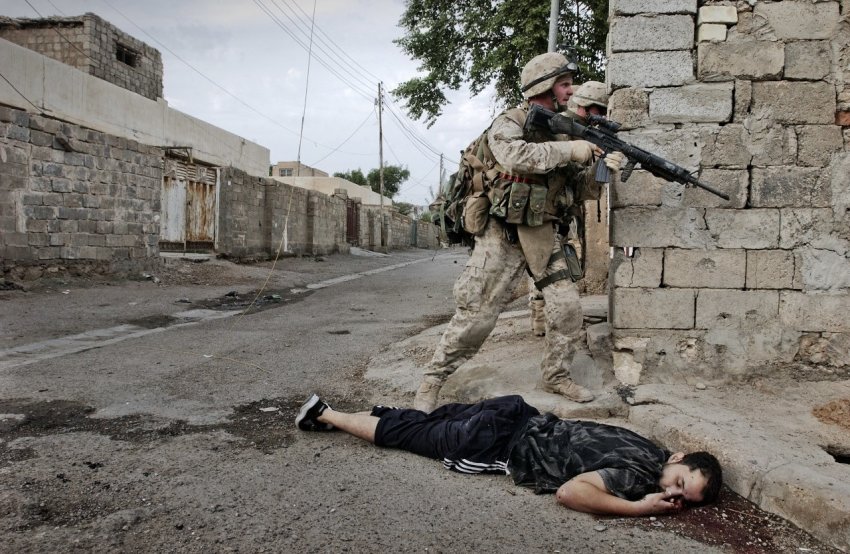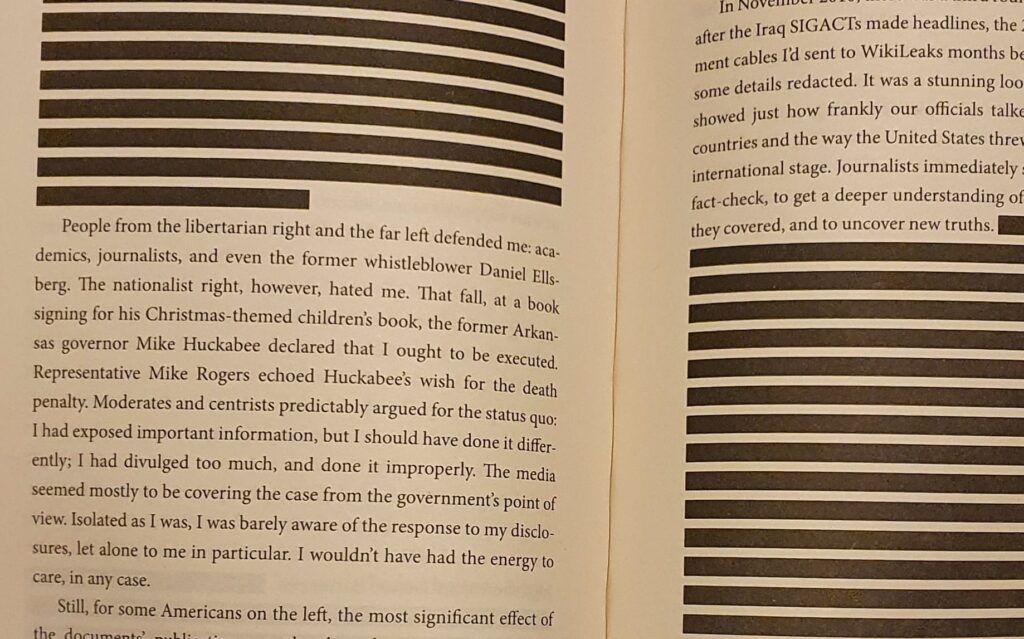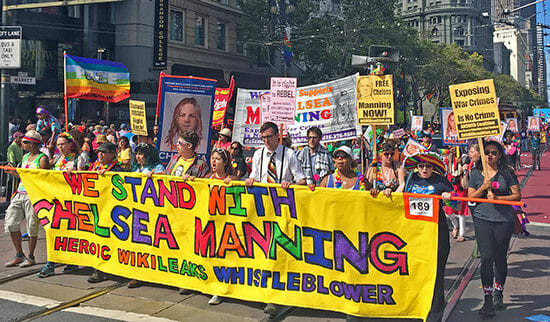Ray Goodspeed reviews “README.txt” (2022 – The Bodley Head/Penguin Random House)
Chelsea Manning’s life-story, described in this book (named after the computer file she uploaded to Wikileaks) is extraordinary on so many levels.
In 2010, while serving with the US military in Iraq, she was responsible for the biggest ever exposure of the dark secrets of US imperialism, blowing open the true story of their wars of occupation. For this she was imprisoned and severely mistreated in the US military legal system. Yet, incredibly, in the middle of all that, she came out as a trans woman in prison and successfully took on the prison authorities!
Those looking for a story of a committed leftist, pacifist, or anti-imperialist, infiltrating the military so as to reveal its secrets, will be disappointed. But instead they will get a fascinating account of her life, how she ended up in the military, and the growing disillusionment and horror about the role she was playing and why she did what she did.
Chelsea was born in 1987, in a small, deeply conservative town in rural Oklahoma, to an American, ex-navy father and a Welsh mother, both of whom drank to excess. She was raised as a boy, of course, in a state that only legalised homosexuality in 2003, and was the victim of bullying for being a “girly boy”. Her father was routinely and severely violent, even leading to social services involvement. She was a gifted mathematician and her main skills and interests were always computer-based, especially the internet, which throughout her life became a vital source of friendship and support.
Suspicion of government
She grew up in the shadow of US Government attack on the religious sect in Waco, Texas in 1993 and the right-wing conspiracist Oklahoma bombing in 1995. In her community and family there was a general suspicion of government, especially federal government, and the way it could interfere with the “precious freedoms” of US citizens. This may have contributed to her eventual decision to leak the US military secrets.
Having lived with her mother in Wales for a few years after her parents’ divorce, she finished school and returned to her father and his new wife back in Oklahoma. That was a disaster. Homeless, aged 18, she “borrowed” her dad’s pick-up truck and took off to Chicago. She spent months trying to keep casual jobs while sleeping in the truck or with men she met in gay nightclubs and her health began to suffer. Thankfully, she was eventually traced by an aunt who took her to live with her in more-affluent Maryland.
She began to secretly and tentatively explore her identity as a trans woman, once she was aware that such a thing existed, and found support, anonymously, on the internet. She also became heavily involved in the online, secret “hacker” community, and honed her skills in breaking into computer systems, mostly just for the hell of it, joining up with more and more advanced and ambitious hacker groups.

(photo – Green Left)
And then, in September 2007, she joined the army! She was a 20-year-old “man” described as “scrawny,” just 5 feet 2 inches (1.58 m) tall, with glasses, who had been constantly victimised for being effeminate. But she had no steady job, no health insurance, no college education and no possibility of ever affording one. For her, as for many other working-class Americans, the army offered a steady income, and free college education. She also saw it as a way of putting the fear of being trans behind her. She could ‘man-up’ and finally make her dad proud of her.
She sailed through the aptitude and intelligence tests and, of course, when she volunteered for computer-based military intelligence, with all her IT skills, they snapped her up. That was the time of the infamous “Don’t Ask – Don’t Tell” policy regarding homosexuality in the US armed forces. The army did not specifically ask about your sexuality, but should your secret become known you would face the threat of exposure and disgrace.
Fierce resilience
The picture that emerges of Manning throughout this book is of someone prone to anxiety and depression but often showing a fierce resilience and refusal to be broken, a kind of reckless courage. During the infamously brutal basic training, she was bullied, of course, and there was a concerted attempt to make her quit, but again she did well, got super-fit and thrived under the discipline. She passed, despite suffering nerve damage to her arms – and her dad attended the graduation ceremony.
Manning was not opposed to the Iraq war. She was vaguely patriotic and even excited, at first, to be part of something she saw as meaningful and important. Her job in the army intelligence unit, at first based in the US and finally in Iraq itself, was to amass vast amounts of data on every conceivable aspect of the lives of the target group, ie those Iraqis designated, for whatever reason, as enemies of the US. Information would also be gathered regarding the normal routines of ordinary people in a given neighbourhood, from traffic flows to shopping and sex lives, as well as more general political developments. She says at one point “I knew more about them than they probably knew about themselves”.
She then utilised sophisticated artificial intelligence programmes to predict what would happen next or likely responses to US actions. This would be fed to US military operatives on the ground in Iraq. Unsurprisingly, chunks of the book were redacted by the Pentagon before publication. It is a chilling warning to the labour movement and other campaigners. Who can seriously doubt that the state would not use such powerful tools against internal enemies of the ruling class?

Manning clearly excelled at her job, and was increasingly seen as an expert, even used by her immediate officers to hack into other parts of the military to get useful information! She initially enjoyed the intellectual challenge and the success, like playing the world’s greatest computer game. She handled the most sensitive information imaginable, yet she was still in her early twenties and ranked as a private.
Her introduction to radicalism came in the campaign for gay marriage in 2008. This drew her deeper into more radical online queer campaigning, including hacking into the websites of homophobic evangelical Christian groups, and even attending a physical demonstration. She began to hate the conservative right more generally, making links and drawing wider conclusions. Her first leak was a confidential military report on the “Don’t Ask – Don’t Tell” policy which she hacked and sent to a gay journalist. One officer had used this policy to blackmail her into sex.
Iraq
Serving in Iraq from late 2009 changed everything. It became clear to her that the entire Iraq operation was a grossly incompetent, confused mess. It had nothing to do with bringing democracy or a better life to the Iraqis, but was merely a show of US military and imperial prestige, a message to the whole world not to mess with the USA.
The casual disregard for innocent Iraqi lives disgusted her. Her own computer programmes showed her the pointlessness of the endless cycle of military action, insurgent response and further US retaliation. Most of all she was incensed by the sanitised propaganda served up to pacify the American people on their news channels. She deeply resented that US citizens were being fooled and lied to by their government about the true nature of the war.
When a heavily-edited and misleading video was shown on American TV of an attack by US forces on vehicles in Iraq, she released the full version to Wikileaks in February 2010, exposing the unprovoked attack on civilians and on clearly-identified Reuters journalists, and the gleeful comments of the US forces. It went viral.
She spent long shifts, day after day, staring at graphic video recordings of violent deaths which had no purpose. She saw no end in sight, becoming traumatised and exhausted but unable to sleep. Isolated, lonely and depressed she felt herself to be on a downward spiral. She had even outed herself to her commanding officer as trans as a possible route out, but her skills were judged to be too valuable to throw her out of the army!
So it was that in January 2010 she downloaded half a million military files from both Iraq and Afghanistan onto a personal memory card, smuggled it home on leave, and uploaded it to Wikileaks, having failed to interest more mainstream newspapers. The story of how that was done, in a coffee bar in a bookshop in Maryland, during a blizzard that kept knocking out the power supply, forms the dramatic and nerve-jangling opening chapter of the book. I will never lose my patience with a progress-bar on my computer ever again!
Arrest and solitary confinement
The files included incident reports and significant activity logs compiled by US forces, videos of military atrocities and diplomatic cables. Altogether she leaked 720,000 classified military documents, the largest leak in history. In May 2010, she was arrested, though many of the most incendiary revelations were not actually published until later. She had little or no idea, in solitary confinement, of what was swirling around the world or how famous she had become.
The treatment of Chelsea Manning was described in a United Nations report as “cruel, inhuman and degrading”. Of course, it must be said at once, that the fate of Iraqi and Afghan detainees and those kidnapped in other parts of the world was much worse, involving monstrous torture, humiliation and abuse. Indeed, however bad it got for Manning, the threat of being transferred to Guantanamo Bay was used to intimidate and terrify her further.

(Photo – Courage to Resist)
She details how she was kept in complete solitary confinement for almost a year, in Kuwait until July and then in military prison in Virginia until April 2011. This meant living in an 8ft by 6 ft cage, under constant observation and subject to taunting of the guards and punitive, petty rules designed to break and humiliate her. In Kuwait this was in a tent in 49° heat. For many months she had no access to a lawyer and had no idea how much time had elapsed, what they would do to her or how long her ordeal would continue.
In military prison she was allowed only one hour a day of solitary, silent walking inside a larger room. She was woken at 5 am and forbidden to lie down, sit or even lean until 8 pm. She was even forbidden from exercising in her cage so tried dancing to imaginary music. She solved maths puzzles in her head to try to stay sane, but under these conditions, her mind began to unravel and she tried to commit suicide on more than one occasion. This just led to retaliation, under the excuse of suicide prevention measures, as more of her rights and her dignity were arbitrarily stripped away. As she explains, she expected to be in prison for the rest of her life and already felt dead.
Only later was she allowed to watch TV alone for one hour a day and write letters to people on an approved list. Eventually she was allowed to read and to see a lawyer.
In April 2011, her lawyer finally got her transferred to a normal military prison in Kansas and she slowly adapted to other prisoners and to prison routines. She became a sort of ‘jailhouse lawyer’ helping other prisoners with their appeals and disputes with the authorities, while feverishly preparing for her own defence. She later led a protest in jail, which was successful but which landed her back in temporary isolation. She got the taste for collective action.
Trial
Her court-martial took place in June 2013, three years after her arrest. She was charged with 22 offences, from simple ‘unauthorised disclosure’ to ‘aiding the enemy’ – effectively treason. She faced ‘life without parole’, an extraordinary sentence, which had never been imposed for disclosures of this kind before.

(Photo – Patrick Semansky/AP)
She refused a deal of a reduced sentence (40 years!) if she pleaded guilty to ‘aiding the enemy’, thereby avoiding an open trial, which the state were understandably very nervous about. She only pleaded guilty to ten crimes that she had obviously committed. She maintained that she did not aid the enemy, but simply educated the American public. The prosecution failed in court to prove any specific harm to US forces caused by the leaks.
She was not a conscientious objector or a pacifist. During her trial, she was supported by many pacifists and was desperately grateful for their tireless efforts on her behalf, yet she still wrote to them, distancing herself from their views. She saw herself, instead, as a ‘transparency activist’.
Faced with a draconian sentence, she very reluctantly consented to plead mitigation on grounds of stress and her gender dysphoria and she was pressured into making an apology by her legal team, which she now regrets. She was found guilty on 17 charges, but not the most serious ones, and sentenced to 35 years in prison.
Transition
Incredibly, Manning, now came out fully as trans and embarked on a legal campaign to be allowed access to hormone treatments to assist her transition, which she got in February 2015, the first prisoner in a military prison ever to achieve this. Next came the right to have transition surgery, culminating in a hunger strike in September 2016. After five days she won a written guarantee that surgery would be granted.
The next campaign was for clemency. Between Trump’s election victory in November 2016 and Barack Obama stepping down in January, she and her supporters lobbied him, though neither he nor the other leading Democrats had given her the slightest support or sympathy. Obama, for reasons Manning still does not know, agreed to commute her sentence to seven years and she was released in May 2017.
Since her release she has continued campaigning and even ran for Senate in Maryland. The government under Trump actually sent her back to jail for a time for refusing to give evidence against Julian Assange! She now describes herself as a transparency activist, security consultant and expert in data science and machine learning.
This book exposes the brutal reality and hypocrisy of US imperialism, through the eyes of an insider. As such, it is invaluable. It is also an incredible testament to courage and resilience and the human spirit



